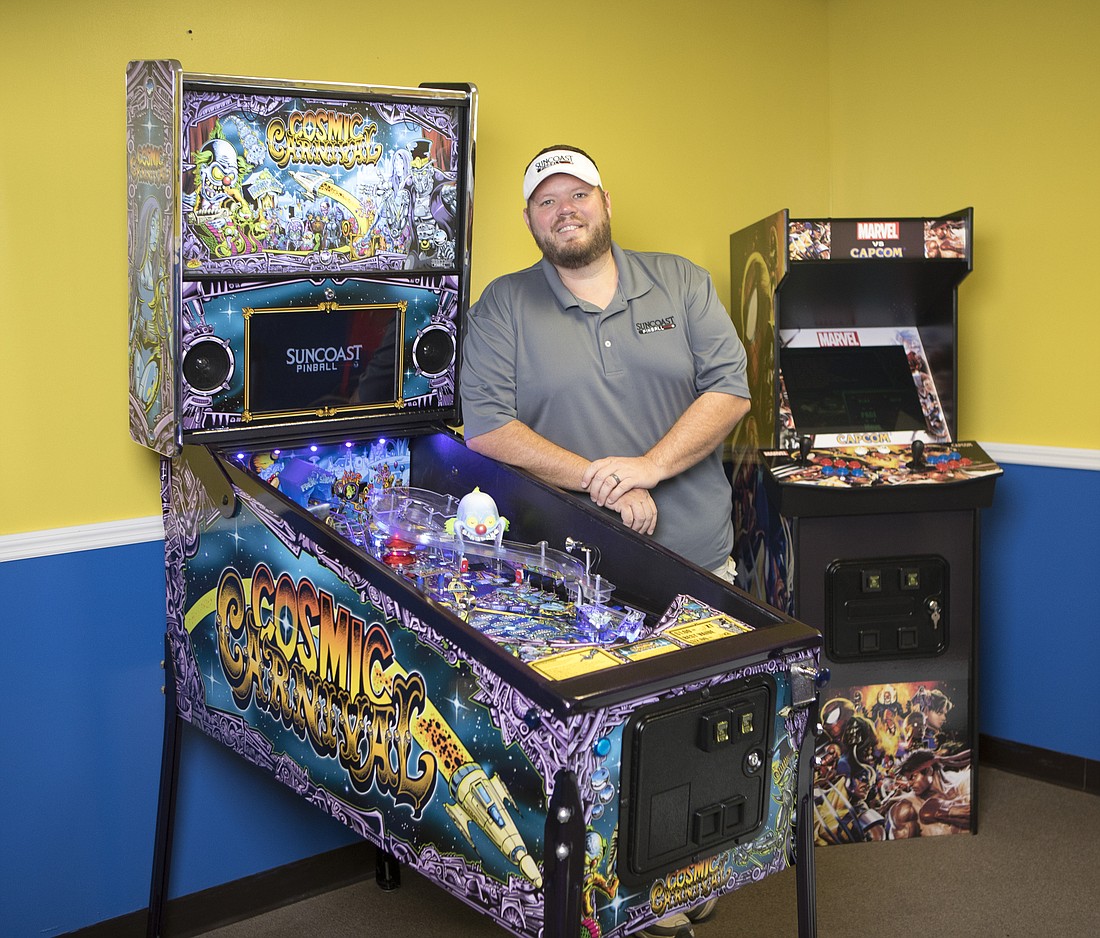- March 31, 2025
-
-
Loading

Loading

During his childhood in northeast Indiana, Jon Weaver would help his father, a restaurateur, earning 25 cents for every table he bussed. A lot of those quarters, he says, wound up in the family restaurant’s arcade games.
“Unbeknownst to me, my father got back about half of my pay,” he says.
That taught Weaver, 42, a valuable lesson about the allure — and profitability — of coin-operated entertainment, which in turn spurred him to launch Suncoast Pinball & Arcade, a Largo-based company that recently rolled out Cosmic Carnival, one of the first original pinball machine designs to hit the market in years.
“Arcade and pinball machines are making a comeback. It’s exciting and good for me because if I wanted to make money, there are easier ways.” Jon Weaver, founder, president and CEO of Suncoast Pinball & Arcade Inc.
But in an era of shuttered malls and nearly infinite home entertainment options, can pinball machine manufacturing be a growth industry? Although he says supply chain could be a future challenge, and he’d like to hire more people to keep up with demand, Weaver likes his chances. As of mid-July, he and his team of 15 employees had produced just one Cosmic Carnival pinball machine but had already signed up 18 dealers in the United States and even more internationally.
“What really surprised me is we are getting inundated with calls from overseas,” Weaver says. “I think we’ve got 20 to 25 dealers from 12, 13 countries who are constantly asking, ‘Can we get this machine?’”
He adds, “There’s a bit of a vacuum overseas. They have a hard time getting the machines, and from what we’ve heard from dealers, they like the ones with original artwork, not licensed designs — what pinball used to be.”
In many international markets, he explains, arcades remain commonplace and there’s a culture of playing coin-op pinball at the local restaurant or pub that never went away.
Arcade and pinball machines are having a moment, even close to home. The Pinball Arcade Museum, a 2,000-square-foot love letter to about 60 classic quarter-eaters of yesteryear, opened Aug. 1 at 2313 Central Ave. in St. Petersburg. Just a few steps away is Right Around the Corner, an arcade- bar bursting at the seams with pinball and arcade games, as well as retro console video game systems like the original Nintendo Entertainment System.
“Arcade and pinball machines are making a comeback,” Weaver says. “It’s exciting and good for me because if I wanted to make money, there are easier ways.”
Although he declines to disclose the company’s revenues, citing the early stage of the pinball venture, Weaver says Suncoast Pinball & Arcade also makes tabletop- and cabinet-style video games, a line of business that generates sales in “the low seven figures.”
While arcade games have gotten cheaper to manufacture, pinball machines — with their complex lighting, circuitry and electronics — have become costlier to make, Weaver says, with low profit margins despite their high price tags: Cosmic Carnival sells for $5,995 and it’s considered an entry-level machine. Weaver’s competitor, Chicago-based Stern Pinball Inc., makes a model priced at $5,700, Weaver says, but also makes higher-end machines that sell for $8,000.
A decade ago, in the depths of the recession, Stern had the U.S. pinball machine market to itself. A handful of rivals have since sprung up, but Weaver sees a huge amount of market share waiting to be captured.
“Pinball has the potential to be much, much larger [than arcade games],” he says. “There is decent money to be made, if you can produce enough of the machines.”
Weaver thinks he’s hit on a winning formula with Cosmic Carnival. The game’s artwork and sound have been produced by a cast of creative personnel whose credits include films such as Pirates of the Caribbean, Blade Runner 2049, Man of Steel and Spiderman 2, as well as cover art for legendary rock band Metallica.
Award-winning pinball artist Dirty Donny joined the Suncoast staff in January, which should help grow the company’s industry cachet and attract additional top-notch talent as production ramps up. The goal is to produce four to five machines per week, but Weaver is already about eight weeks behind because the tight labor market makes it difficult to find properly skilled-up candidates.
“We’d like to staff up so we can do about 10 to 12 per week,” Weaver says. “But the reason we can’t just go out and hire 10 people is you’ve got to give them training.”
Supply chain, because of pinball machines’ highly specialized components, is another looming challenge. “Even Stern has supply problems, so I’m assuming it’s a hurdle that we will face,” Weaver says, “but once we scale up, we’ll try to stay ahead of the curve.”
(This story was updated to reflect that the term Barcade is trademarked, for a chain of arcade bars.)
Read all of the Business Observer's Made on the Gulf Coast articles:
National manufacturers highlight industry anxiety
At fire truck plant, attention to detail reigns — right down to shiny red paint
Following career in political fundraising, entrepreneur enters bright world of lampshades
Cabinetmaker, staying nimble, builds solid business
Danish draft beer equipment maker drinks up growth